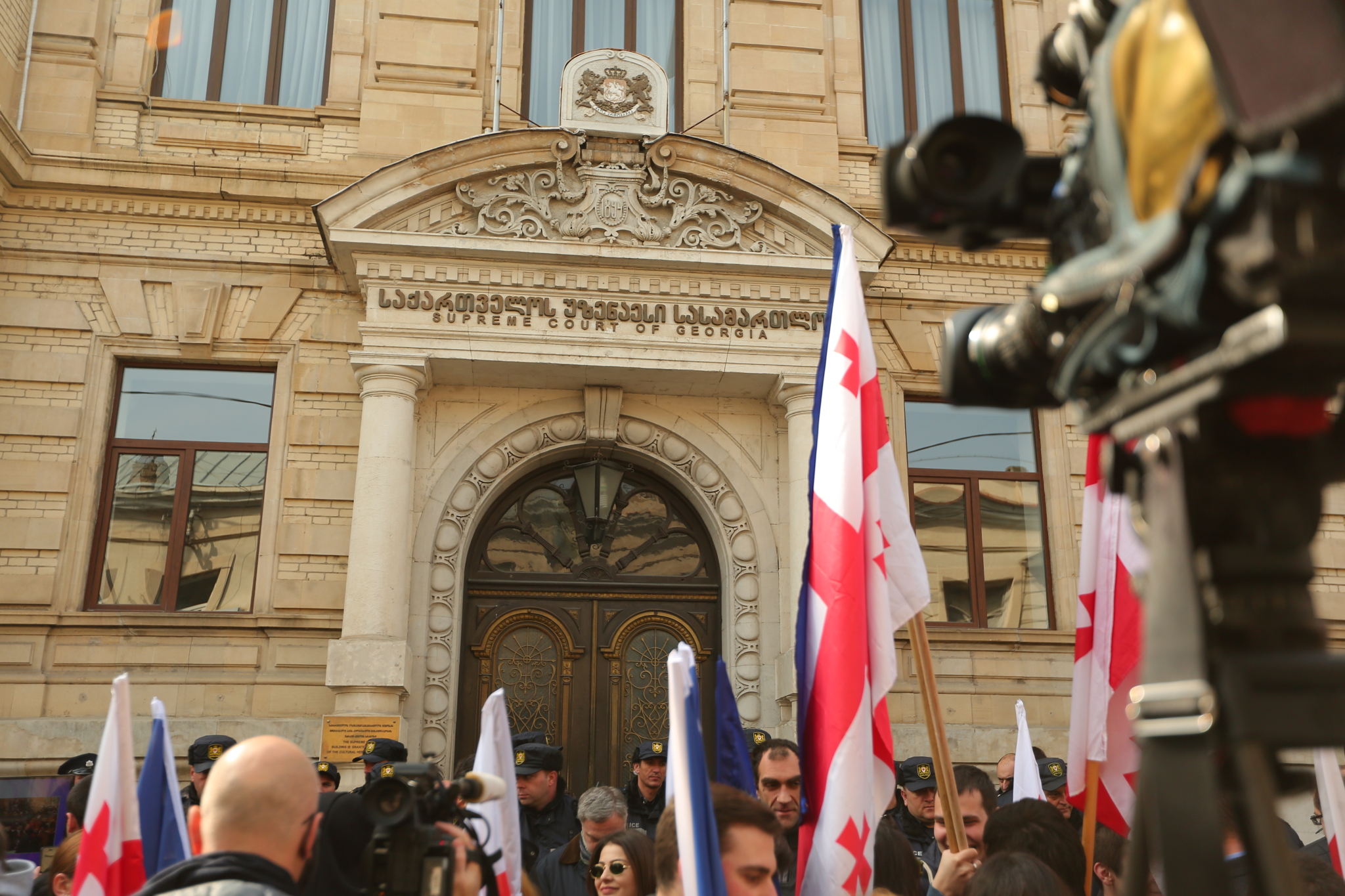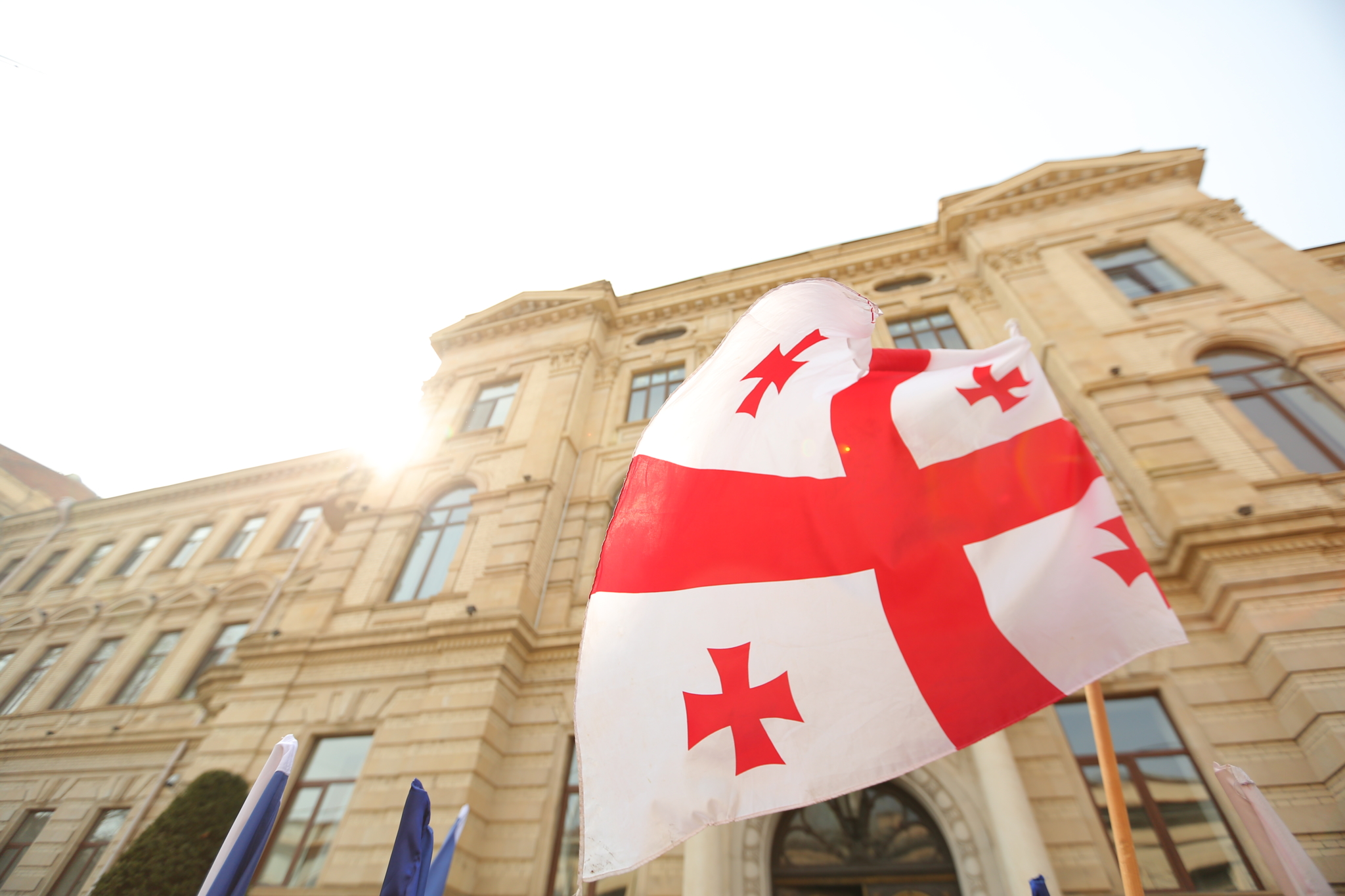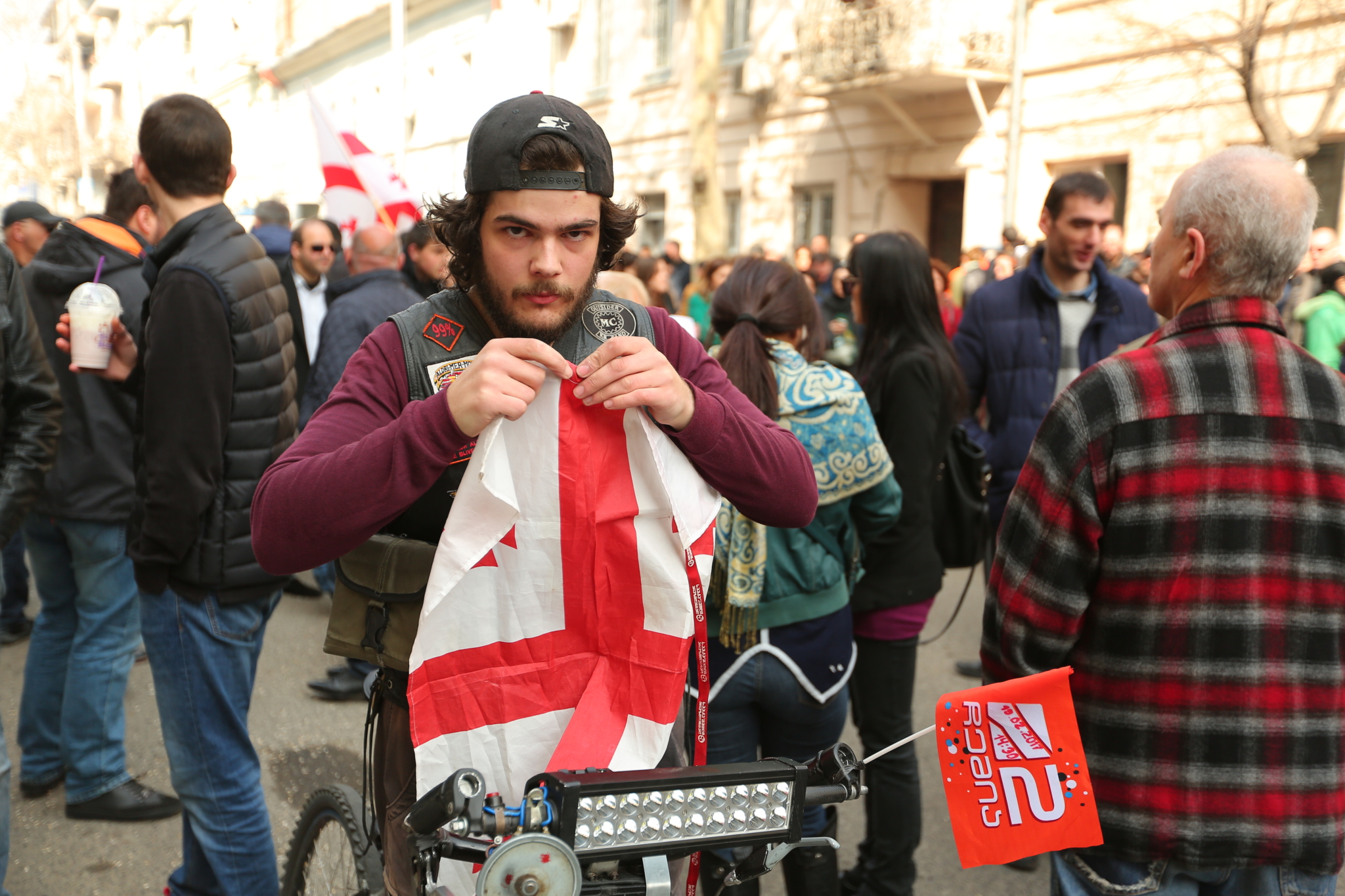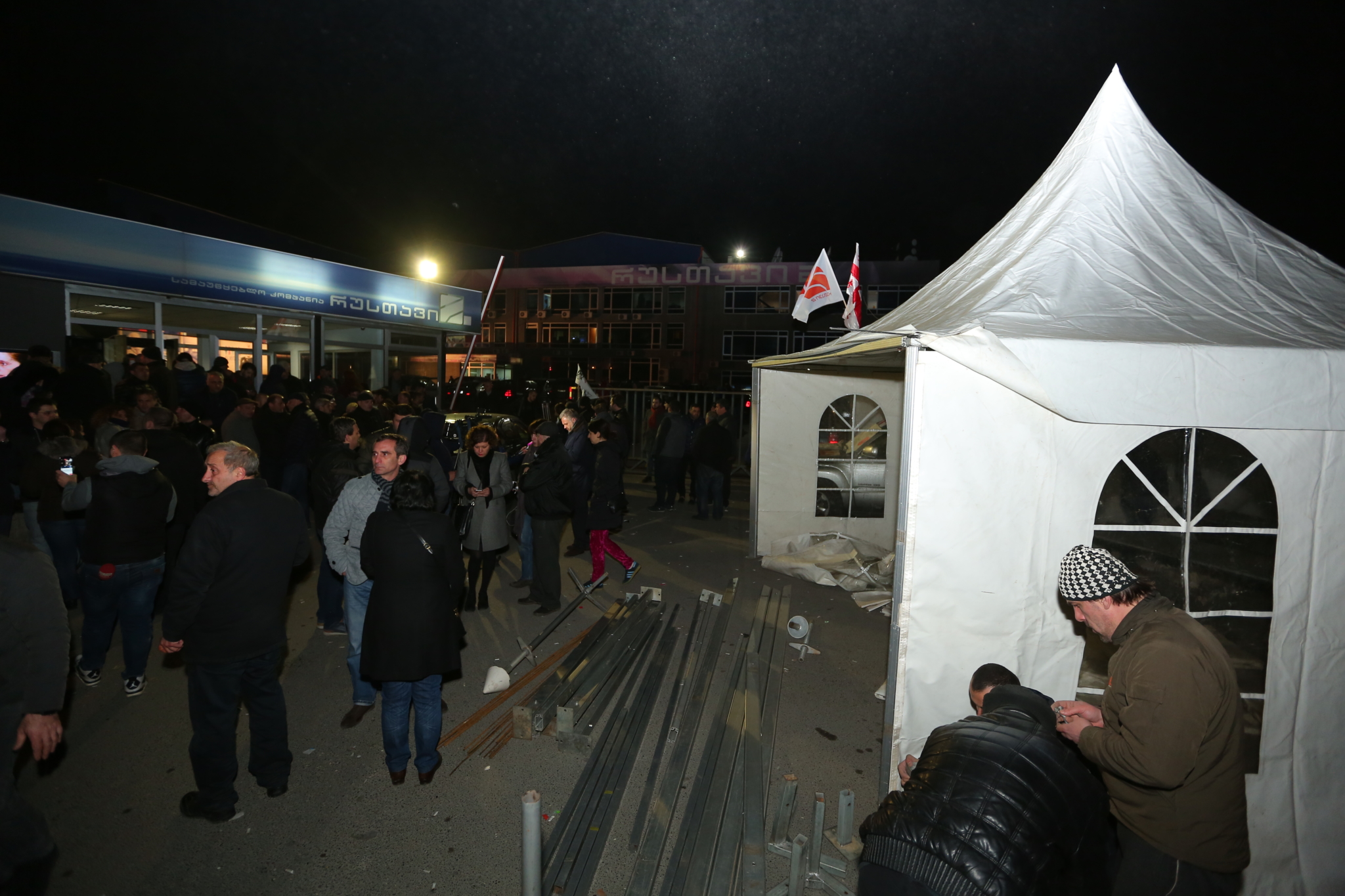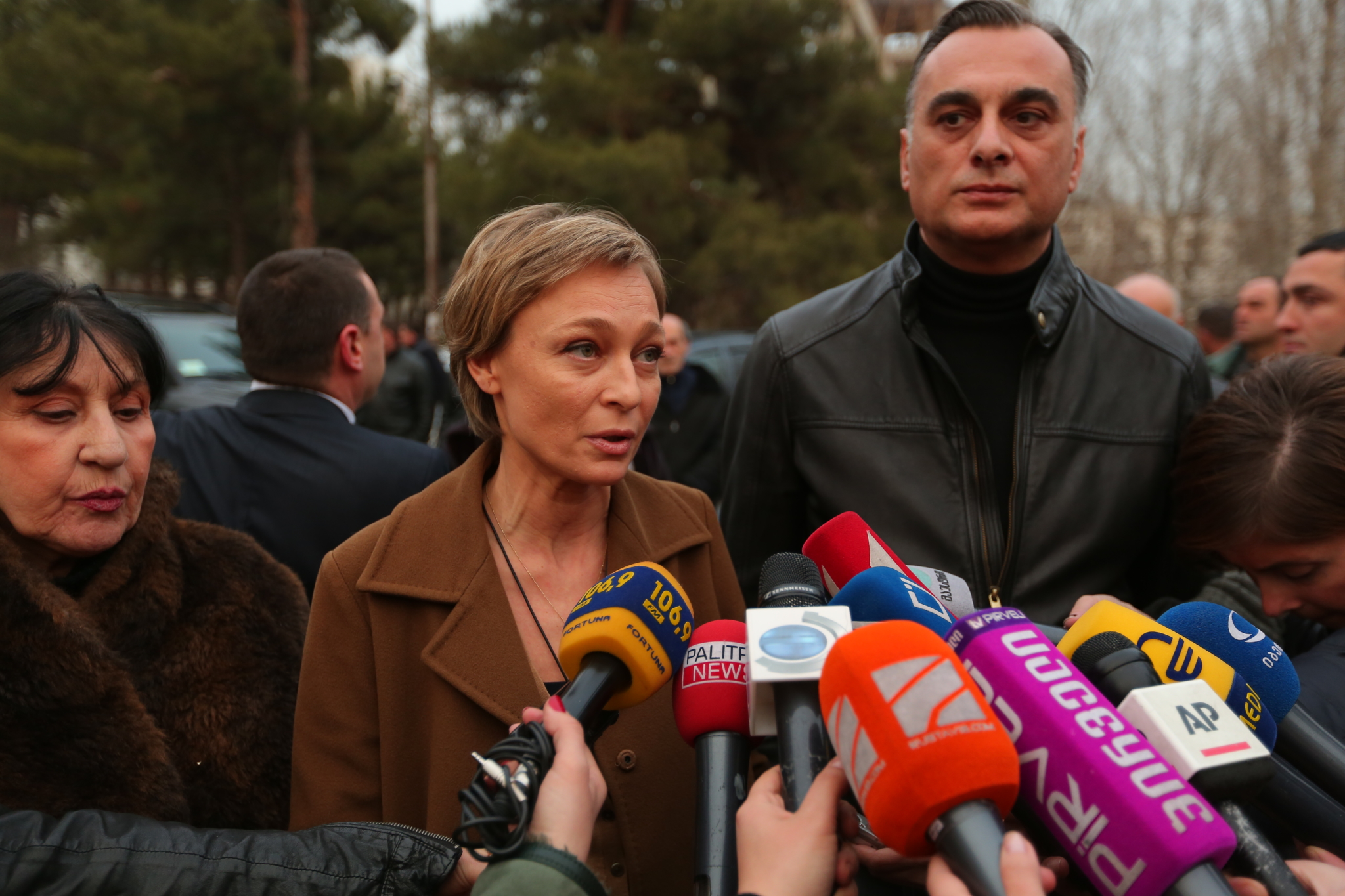What awaits Rustavi-2 next?
On March 2, the Supreme Court drew the line in the years-long dispute over Rustavi 2 TV ownership.
The Grand Chamber’s 9-member bar unanimously recognized the broadcaster’s present owner as illegal and handed the TV company to its former owner, businessman Kibar Khalvashi. Khalvashi was granted 60% of the TV company’s shares, while the rest 40% were transferred to Panorama LLC, a company also owned by Khalvashi, which means that Khalvashi has actually become an owner of 100% of shares.
The Supreme Court’s Grand Chamber is the highest judicial instance in Georgia and it’s rulings are not subject to appeal.
However, as the TV company staff has put it, a miracle happened. The European Court on Human Rights (ECHR), that the TV company lawyers appealed to on the same day, March 2, decided to apply an interim measure and temporarily suspend enforcement of the Supreme Court ruling until March 8.
The ECHR will needs those few days to study the case materials. The Strasbourg Court expects Rustavi 2 TV lawyers to produce additional case-related materials so as to decide, whether to extend or not the interim measure for longer period until it considers the case on the merits and delivers final judgment on who isthe owner of Rustavi 2.
If the ECHR doesn’t decide to further suspend the enforcement, thenthe Supreme Court ruling will remain valid and nothing will prevent its enforcement. In other words, the owners will be changed in the Public Register and a new manager may appear in the TV company at any time.
In Muradashvili’s words, it may take the ECHR months oreven years to consider the case on its merits and find, who the legitimate owner of Rustavi 2 TV is. Therefore, it’s important to suspend the Supreme Court ruling, so as to prevent infliction of irremediable damage to the freedom of speech in the country.
Whether the ECHR will suspend or not the enforcement of Supreme Court ruling until the final consideration of the case will be known on March 8.
The U.S. Embassy in Georgia immediately responded to the Supreme Court’s ruling on Rustavi 2 TV case.
As the U.S. Embassy pointed out on its officials Facebook page, pluralistic media environment is essential for Georgia.
“The United States views with concern the impact of the Supreme Court’s decision regarding Rustavi 2, which could effectively limit the access of opposition voices to Georgian broadcast media. A pluralistic media environment is essential for Georgia’s democratic growth and Euro-Atlantic aspirations. We urge the Georgian government to take steps to ensure that the media environment remains free, open, and pluralistic,” the U.s Embassy’s statement reads.
Rustavi 2 TV case was also in focus in the U.S. Department of State’s annual human rights report. As it is pointed out in the document, the judicial proceedings on Rustavi 2 TV case, as well as the government’s interference with the trial, raised many questions.
‘Rustavi 2 is mine’
On March 2, while the consideration of Rustavi 2 TV case was underway in the Supreme Court’s Grand Chamber, a lot people gathered outside the court building. Hundreds of Rustavi 2 TV supporters came to the court building with flags and banners. ‘Rustavi 2 is mine’- the inscription on the banners read.
The Supreme Court ruling was met with whistles and aggressive shouting. Then the rally participants moved to the TV company building, where they put up tents and stayed overnight to physically defend the broadcaster in case the new owner decided to get into the building.
“We’ve witnessed the failure of democracy,” Rustavi 2 TV General Director, Nika Gvaramia, stated at a special briefing.
Rustavi 2 is the most popular TV channel in Georgia and the TV ratings testify to that.
A few hours after the announcement of the Supreme Court’s ruling, Nika Gvaramia, Rustavi 2 TV General Director, held a special briefing. Standing at the rostrum, surrounded by the TV channel staff, Gvaramia offered Kibar Khalvashi to hand the TV company’s shares over to the broadcaster staff. As he noted, the company staff would manage to accumulate necessary funds and buy out the TV channel.
“I understand that you’ve found yourself in a rather difficult situation. You have killed the freedom of speech and independent judiciary at once and I’m suggesting you the way out of this impasse,” Gvaramia stated.
In his words, the Supreme Court’s ruling implied that Rustavi 2 TV would be handed over to the country’s informal ruler, Bidzina Ivanishvili.
Who is Kibar Khalvashi?
However, Kibar Khalvashi didn’t accept Gvaramia’s offer. Speaking on air of each TV programhe was invited to, Khalvashi has had to prove that he wouldn’t be pushing through the government’s interests and that the authoritiesweren’t behind him.
In his words, he is going to reshape Rustavi 2 into mass media that will be free of any party influence.
According to Khalvashi, the protest around Rustavi 2 TV case has been managed by Mikheil Saakashvili and the National Movement and it in no way reflects the position of the TV company staff.
Kibar Khalvashi, a Georgian business tycoon who won the case in the Supreme Court, owned Rustavi 2 TV in 2004-2006. He was a close ally of then-Defence Minister, Irakli Okruashvili and a proxy person to President Saakashvili. The journalists, who used to work in the TV company in that period, admit that there was censorship on the TV channel during Khalvashi’s management and that he oftentimes openly blocked expression of critical opinion on air. Later on, as Okruashvili moved into opposition, Khalvashi was no longer acceptable for Saakashvili’s government. Former leadership posed serious problems to Khalvashi’s business in Georgia. Kibar Khalvashi claims, he was forced to cede Rustavi 2 TV shares in that period.
However, the circumstances under which Khalvashi became the TV company owner in 2004 seem to be rather vague. The company founders and initial owners, in turn, complain that in 2004, they were also forced to give up on their shares in favour of Khalvashi.
According to Transparency International-Georgia, the broadcaster owner changed 20 times within the period from 2004 till 2012. Each owner change story was related to some vague deals that still raise many questions. And there was Saakashvili’s government behind each of those deals.
Although, throughout the 23-year history of TV company’s existence, Rustavi 2 TV owners have been replacing each other under suspicious circumstances, fewer will nowadays question the fact that there are authorities behind Khalvashi. The latter is trying to seize the TV company from its former owner under the pretext of a private dispute and change the broadcaster’s editorial policy. The incumbent government tries to take the same path that the former authorities followed – the NGO representatives believe.
Kibar Khalvashi’s liking for the ruling Georgian Dream coalition could be clearly seen on his Facebook page. The Georgian Dream’s campaign banner, that Khalvashi uploaded as a profile photo during the 2012 parliamentary election, is still preserved in his photo album.
“It’s a private dispute”
Representatives of the ruling team flatly deny any interference with the trial, regarding Rustavi 2 TV case as a private dispute.
Against the background of the recent dramatic and sweeping changes in Georgian media environment, the authorities assurance that there is no risk to media plurality in Georgia seems very unconvincing.
Just recently, the country’s public broadcaster’s management was replaced by the government-allied individuals, who made a decision to shut down some critical programs; pro-governmental Imedi TV bought once oppositional and independent Maestro TV and Ivanishvili family’s owned GDS TV also joined this media conglomerate. With these facts in mind, the government finds it harder to convince the international observers that it doesn’t interfere in Rustavi 2 TV case.
Georgian President, Giorgi Margvelashvili, also believes there are problems with regard to Rustavi 2 TV case.
“By putting a halt to the pro-western Rustavi 2 TV we will deliver a serious blow to Georgian democracy and country’s international image,” said Georgian President, Giorgi Margvelashvili.
In his words, given the sensitivity of the matter, before the ECHR delivers its final judgment, the enforcement of the Supreme Court ruling should be suspended and Rustavi 2 should continue broadcasting in its usual mode.
‘Strasbourg has saved us’
The majority of experts and NGOs believe that the Supreme Court delivered a harmful judgment for the country.
By handing over the TV company shares to Kibar Khalvashi the authorities have once again proved that they will resort to any possible means toaccomplish their desire.
“Today, the Supreme Court has abolished the judiciary, leaving us without any hope that this country has the court that one can apply to for justice whenever necessary. Today, the government has proved that it will go to any lengthjust to satisfy its needs, to subjugate mass media,” said Nino Jangirashvili, a journalist, Kavkasia TV CEO, who joined her colleagues and came to Rustavi 2 TV building to express her solidarity.
Georgian President’s Spokesperson, Eka Mishveladze, also pointed to obstruction of the democratic processes in the country.
“Democracy is endangered if there are no different opinions and critical views in the country. It’s my opinion, as a journalist and your colleague. It would be impossible for me not to come here today, where there is a great risk to free and diverse opinions,” said Eka Mishveladze.
According to Eka Gigauri, Transparency International – Georgia Executive Director, the Supreme Court’s ruling has turn upside down the ownership right-related issues.
“It’s really an incredible decision, because by this decision the government has once again proved that any different opinion is unacceptable for it. This decision has put upside down the ownership right related issues. The people here are defending different opinion, free media environment and judicial system,” said Gigauri.
Representatives of NGOs and opposition parties, as well as journalists, have signed a special petition in support of Rustavi 2 TV channel.
